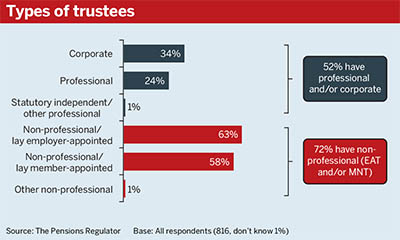In defence of lay trustees
From the blog: The Pensions Regulator has found that professional-only trustee boards are better run. That’s not all that surprising. However, non-professionals have lots to bring to trustee boards and their value should not be underestimated.
In October last year, the regulator published its ‘Trustee Landscape Quantitative Research’, which found professional trustees spent more time on their trustee duties, had a better knowledge of pensions law, and had a better ability to assess the value for money of investment advisers than lay trustees. The theme was picked up in the pensions press.
Of course, there can be no doubting the benefits professional trustees bring to schemes up and down the country, and I am very lucky to work with many of them.
With more and more regulation and a heavy burden on trustees, their knowledge and experience is invaluable – particularly in complex matters such as litigation.
However, it would be a shame if the industry lost its lay trustees completely. They often have a close link to members, as well as an intimate knowledge of the scheme and what matters to members.
They often have a real understanding too of the sponsor’s history. In my experience, lay trustees can bring an emotional connection and accountability to the job that can instil confidence in members and makes communication easier. These skills can work well to complement the skills of professional trustees.
When I have worked with lay trustees on large, complex matters, they are quite often the ones who bring the pensions professionals (including advisers) back to basic principles and objectives: testing and probing the significance of the detail being discussed. Combined with a professional’s expertise, this can produce a very well balanced board.
The issue seems to be a live debate as far as the regulator is concerned. A key point for me is that different types of trustee boards will suit different schemes at different times. We might end up with professional-only trustees, or professional trustees being required on all schemes, but for now there should be no ‘one-size-fits-all’ approach.
Chris Brown is an associate in the pensions team at law firm Burges Salmon
Most Viewed
- What does Labour have in store for the pensions industry?
- Dashboard costs rose by 23% in 2023, figures show
- LGPS latest: GLIL backers invest £475m for UK infrastructure push
- Border to Coast launches UK strategy in major private markets push
- How the pensions industry can better support people with mental health problems


